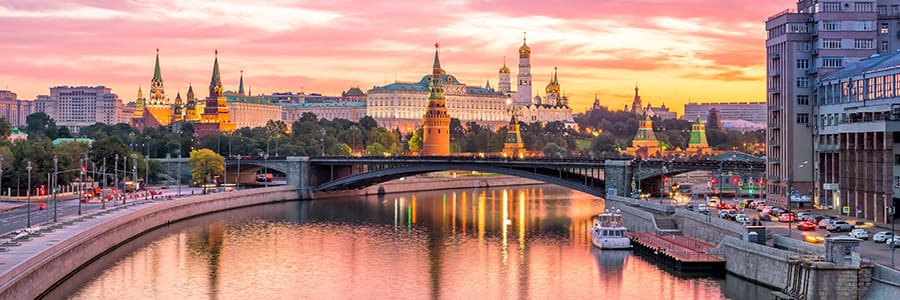
About The Volga River
The Volga is highly symbolic in Russian culture and is often referred to as Mother Volga in literature and folklore.
The Volga is the longest river in Europe, running 2,294 miles from the Valdai Hills northwest of Moscow down to the Caspian Sea, with an ingenious linking of rivers and lakes connecting her another 200 miles west, to St. Petersburg. Eleven of the twenty largest cities of Russia, including the capital, Moscow, are located in the river’s watershed.
To cruise the Volga is not only to embark on one of the world’s greatest river journeys, but also to journey to the very heart and soul of Russian history, art, and culture. The list of treasures is endless: Imperial cities, grand artistic treasures, medieval monasteries, massive monuments, onion-domed cathedrals, breathtaking modern marvels, and the vast and beautiful Russian countryside, dotted with delightful small towns — all the magic and mystery of Russia is on display along the banks of the fabled Volga.
Russia has long been one of the most popular river cruise destinations for adventurous travelers, with itineraries offering time in both Moscow and St. Petersburg being the most desirable. While most major river cruise lines offer Russian itineraries, most charter the ships they feature; Viking is the exception, with its own cruise ships. The Volga River is just a part of your Russian river cruise voyage as you will sail through many lakes as well as other rivers to get from Moscow to your final destination of St. Petersburg. Or you could journey south further along the Volga towards the Caspian Sea for an even more fascinating cultural landscape.
Volga River Stats
Length: 2,294 miles
Depth: Various
Source: Valdai Hills, Tver Oblast, Russia
Mouth: Caspian Sea near Astrakhan, Russia
Locks: 10
Countries: Russia
Learn More About the Volga River of Europe
The Volga River, known as “Mother Volga” to many Russians, is the longest river in Europe and one of the most iconic natural features of Russia. Spanning a length of approximately 2,294 miles (3,700 kilometers), it plays a vital role in the geography, history, and culture of the region. From its source in the Valdai Hills to its mouth in the Caspian Sea, the Volga River weaves through diverse landscapes, nourishing vast territories, and shaping the lives of millions.
Geography and Hydrology
The Volga River begins its journey in the Valdai Hills, which is located in the northwestern part of Russia. Here, it emerges from the Tver Oblast as a small stream and gathers strength as it flows southward. The river’s course takes it through several major regions of Russia, including Tatarstan, Samara, and Volgograd, before ultimately reaching the Caspian Sea. Along the way, it receives numerous tributaries, the most significant being the Oka River. The Volga is renowned for its vast drainage basin, covering approximately 20% of the European landmass. This immense basin plays a crucial role in Russia’s water supply, agriculture, and transportation network. It also supports an array of diverse ecosystems, ranging from boreal forests in the north to steppe and semi-desert landscapes in the south.
Historical Significance
The Volga River holds profound historical importance for Russia. Its fertile floodplains have been inhabited by various civilizations for millennia. Archaeological discoveries reveal settlements dating back to the Bronze Age along its banks. In more recent history, the Volga served as a trade route during the time of the Golden Horde and played a pivotal role in the formation of the Russian state. One of the most significant chapters in the Volga’s history is its role during World War II. The Battle of Stalingrad, fought in the city that bears the river’s old name, Volgograd, was a turning point in the conflict. The city’s strategic location on the Volga made it a focal point in the battle against Nazi Germany. The Volga served as a lifeline for supplies and reinforcements to the Soviet forces, and the victory at Stalingrad marked a turning point in the war.
Economic Significance
The Volga River has long been a crucial economic artery for Russia. Its navigable waters have enabled transportation of goods, including grain, minerals, and oil, from the heartland of Russia to international markets. The construction of dams and locks has facilitated the navigation of large vessels, making the Volga a vital component of Russia’s transportation infrastructure. In addition to its role in shipping, the Volga and its tributaries have been harnessed for hydroelectric power generation. Dams such as the Volgograd Hydroelectric Station and the Uglich Hydroelectric Station have helped meet the region’s energy needs and have contributed to the development of nearby communities.
Cultural Significance
The Volga River has also deeply influenced the culture of Russia. It has been a source of inspiration for poets, writers, and artists for centuries. Numerous folk songs and ballads celebrate the river’s beauty and significance. The Volga’s vastness and changing landscapes have been captured in the works of famous Russian painters like Ilya Repin and Ivan Aivazovsky. One of the most famous landmarks along the Volga is the city of Kazan, known for its unique blend of Russian and Tatar cultures. The Kazan Kremlin, a UNESCO World Heritage Site, stands as a symbol of this cultural fusion. The Volga’s influence extends beyond Russia’s borders, as it has been mentioned in the literature and works of composers from around the world.
Environmental Challenges
Despite its importance and natural beauty, the Volga River faces several environmental challenges. Pollution from industrial and agricultural sources has impacted water quality, threatening the river’s ecosystem and the health of those who rely on it for drinking water and fishing. Efforts to mitigate pollution and restore the river’s health are ongoing but face significant challenges.
